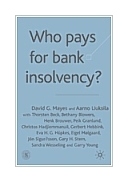How to avoid taxpayers
paying for bank failures and banking crises? This book provides a proposal and a critique
by twelve independent experts. It is addressed particularly to the threat posed in Europe
by having large international banks, a history of bailouts and limited means of resolving
any future banking crises. It shows how political imperatives and legal constraints
currently result in economic losses in many countries round the world.
Table of Contents
List of Tables
List of Figures
Preface
Acknowledgements
Notes on the Contributors
Introduction
PART I: THE PROBLEM AND THE PROPOSED SOLUTION
An Overview of the Issues; D.G.Mayes
The New Approach to Orderly Bank Exit: Questions and Answers; A.Liuksila
PART II: HOW BIG IS THE PROBLEM?
Disclosure as a Cure for Moral Hazard: Necessary but Insufficient; G.H.Stern
The Incentive Compatible Design Of Deposit Insurance and Bank Failure Resolution: Concepts
and Country Studies T.Beck
Small Countries, Large Multi-Country Banks: a challenge to supervisors -- the example of
the Nordic-Baltic area; J.Sigur?sson
The Economic Impact of Insolvency Law; B.Blowers & G.Young
Do Bank Exit Regimes affect Banking Conditions?; P.Granlund
PART III: APPROACHES TO SOLVING THE PROBLEM
A European Approach to Banking Crises; H.Brouwer, G.Hebbink & S.Wesseling
Avoiding a Crisis: Lessons from the Danish Experience; E.Molgaard
Learning Lessons and Implementing a New Approach to Bank Insolvency Resolution in
Switzerland; E.H.G.Hüpkes
Bank Resolution Policy and the Organization of Bank Insolvency Proceedings: Critical
Dilemmas; C.Hadjiemmanuil
Appendix 1: The Proposed Approach to Bank Insolvency Legislation; D.G.Mayes, L.Halme &
A.Liuksila
Appendix 2: The Basel Committee Guidance on Weak Banks
References
Index
Author Biographies
DAVID G. MAYES is Advisor to
the Board of the Bank of Finland and Professor of Economics at London South Bank
University. He was previously Chief Manager and Chief Economist at the Reserve Bank of New
Zealand. He is Honorary Professor at the University of Stirling and Adjunct Professor at
the University of Canterbury.
AARNO LIUKSILA is the Director of IA Management, based in Washington. Until recently, he
worked for the legal service of the International Monetary Fund.
390 pages
Księgarnia nie działa. Nie odpowiadamy na pytania i nie realizujemy zamówien. Do odwolania !.


